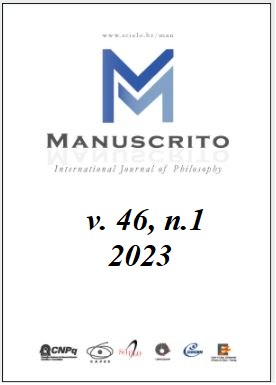Resumo
Este artigo defende uma interpretação construtiva da Crítica da Razão Pura, que é construída em analogia com uma construção experimental que Kant acredita ser característica da química. Também defendo uma maneira de conciliar a perspectiva metodológica do método construtivista com a da reflexão transcendental. Portanto, forneço uma explicação construtiva para o que Kant descreve como sendo a razão pura e o argumento da dedução transcendental. Proponho enquadrar as diferentes perspectivas de tal forma que a construção experimental seja a ratio cognoscendi da razão pura, enquanto a razão pura seja a ratio essendi da construção experimental. O'Neill (1989, 2015) é um dos mais importantes estudiosos que defenderam uma leitura construtivista da Crítica da razão pura (CPR). Neste artigo, desenvolvo e exploro novos aspectos dessa linha de interpretação. Uma das principais críticas levantadas contra as leituras construtivistas da filosofia de Kant é um suposto compromisso com o subjetivismo ou o voluntarismo (cf. Kleingeld & Willaschek 2019). Essa preocupação levou alguns estudiosos a renomear sua posição como constitutivista (Korsgaard 2009; Sensen 2013, 2017; Formosa 2011). O constitutivismo pretende ser um tipo de construtivismo capaz de evitar o voluntarismo. No entanto, às vezes fica difícil diferenciar entre as posições constitutivista e fundacionalista, que se baseiam na reflexão transcendental e implicam uma espécie de perspectiva realista.
Referências
Bacon, Francis (2000): The New Organon. Cambridge texts in the history of philosophy. Cambridge.
Formosa, Paul (2011): Is Kant a Moral Constructivist or a Moral Realist?, in: European Journal of Philosophy 19(3), pp.1-27.
Förster, Eckart (ed.) (1989): Kant’s Transcendental Deductions, Stanford.
Gloy, Karen (1996): Kants Philosophie und das Experiment, in: Schönrich, Gerhard; and Kato, Yasushi (Hrsg.) Kant in der Diskussion der Moderne, Frakfurt am Main.
Henrich, Dieter (1966): Zu Kants Begriff der Philosophie, In: Kaulbach, Friedrich; ritter, Joachim (Eds.). Kritik und Metaphysik (Festschrift für Heinz Heimsoeth), Berlin, pp. 40-59.
_____. (1969): The Proof-Structure of Kant's Transcendental Deduction, in: The Review of Metaphysics, 22(4), pp. 640-659.
_____. (1975): Die Deduktion des Sittengesetztes, in: Schwan, A (Org.). Denken im Schatten des Nihilismus. Festschrift für Wilhelm Weischedel zum 70. Geburststag. Darmstadt.
_____. (1984): Die Beweisstruktur der transzendentalen Deduktion der reinen Verstandesbegriffe, in: Tuschling, B. (Org.). Probleme der 'Kritik der reinen Vernunft'. Kant-Tagung Marburg 1981, Berlin.
_____. (1989): Kant’s Notion of a deduction and the Methodological Background of the First Critique, in: Förster, Eckart (ed.). Kant's Transcendental Deductions. Stanford.
_____. (2001): Systemform und Abschlussgedanke. Methode und Metaphysik als Problem in Kants Denken, in: Gerhardt, V. (Orgs.). Kant und die Berliner Aufklärung, Berlin.
Höffe, Otfried (2003): Kants Kritik der reinen Vernunft. Die Grundlegung der Moderne Philosophie. München.
Kaulbach, Friedrich (1978): Das Prinzip Handlung in der Philosophie Kants. Berlin.
Klein, T. Joel (2020): Systematic perspectives on the distinction between appearances and things in themselves in the Critique of Pure Reason, in: Studia Kantiana, v. 18, p. 139-175.
_____. (2019): Ciência e Método em Bacon e Kant, in: Revista Dissertatio de Filosofia, v. 49, p. 287-311.
Kleingeld, Pauline & Willascheck, Marcus (2019): Autonomy without Paradox: Kant, Self-Legislation and the Moral Law, in: Philosophers’s Imprint v.19, n.6, pp.1-18.
Korsgaard, Christine M. (1996): Creating the Kingdom of Ends, Cambridge.
_____. (1996b): The Sources of Normativity, Cambridge.
_____. (2009): Self-Constitution: Agency, Identity, and Integrity, Oxford.
Møller, S. (2020). Kant's Tribunal of Reason: Legal Metaphor and Normativity in the Critique of Pure Reason. Cambridge University Press.
O’Neill, Onora, (1989): Constructions of Reason, Cambridge University Press.
_____. (2015): Constructing Authorities, Cambridge University Press.
Pievatolo, Maria Chiara (1999): The Tribunal of Reason: Kant and the Juridical Nature of Pure Reason, in: Ratio Juris, 12, pp. 311-327.
Proops, Ian (2003): Kant's Legal Metaphor and the Nature of a Deduction, in: Journal of the History of Philosophy, 41 (2), pp. 209-229.
Rawls, John (1980): Kantian Constructivism in Moral Theory, in: Journal of Philosophy 77, pp. 515-72. Reprinted in Rawls 1999b, pp.303-58.
Rawls, John (1989): Themes in Kant’s Moral Philosophy, in: Förster (ed.): 81-113. Reprinted in Rawls 1999, pp. 497-528.
_____. (1996): Political Liberalism, rev. ed., New York.
_____. (1999a): A Theory of Justice, rev. 2nd., Oxford.
_____. (1999b): Collected Papers, ed. S. Freeman, Cambridge, MA: Harvard.
Reath, Andrews (2006): Agency and Autonomy in Kant’s Moral Theory: Selected Essays. Oxford.
Schafer, Karl (2019): Kant: Constitutivism as capacities-first philosophy, in. Philosophical explorations. DOI: 10.1080/13869795.2019.1599049
Seeberg, Ulrich (2007): Kants Vernunftkritik als Gerichtsprozeß. In: Bowman, B. (Org.). Darstellung und Erkenntnis. Paderborn.
Sensen, Oliver (2013): Kant's Constructisivm, in: Bagnoli, Carla (ed.): Constructivism in Ethics, Cambridge University Press, pp. 63-81.
_____. (2017): Kant's Constitutivism, in: E. Schmidt and R. dos Santos (eds.), Realism and Antirealism in Kant's Moral Philosophy (New Essays), Berlin, pp. 197-220.
_____. (2013): Moral Skepticism, Constructivism, and the Value of Humanity, in: Carla Bagnoli (ed.), Constructivism in Ethics (Cambridge: Cambridge University Press), pp. 22-41.
Trevisan, Diego K. (2018): Der Gerichtshof der Vernunft: Eine historische und systematische Untersuchung über die juridischen Metaphern der Kritik der reinen Vernunft. Würzburg.
Wind, Edgar (2001): Das experiment und die Metaphysik, Frakfurt am Main.

Este trabalho está licenciado sob uma licença Creative Commons Attribution-NonCommercial 4.0 International License.
Copyright (c) 2023 Manuscrito: Revista Internacional de Filosofia


